Some links on this page are affiliate links. They may generate revenue for this site but there’s no extra cost to you if you make a purchase. More on affiliate links
17 useful tips on how to get deals and discounts for hotels
We all love to travel and traveling means you need a place to stay, often a hotel. Of course, we all want the best deal and the best price. Nobody wants to pay more when they can get it for less. Besides, we want to save money to stretch our travel budget.
It’s easy to book a room at a hotel as long as you have a credit card. But are you paying more than you should? Knowing how to get a deal at the best price will help you save lots of money. Especially so if you’re traveling a lot or on a long trip. So you need to know how to find and get a deal.
So here are some helpful tips on how to get cheap hotel rates. There are no tricks or secret hacks here, just simple practical tips. One thing to remember though, getting a deal is not about the cheapest. It’s about booking a room that suits your needs and offers the best value for your money.
YOU MAY ALSO LIKE
- The Best Hotel Booking Sites
- The Best Vacation Rental Sites
- How to Get Deals for Vacation Rentals
- Top Picks of Travel Booking Sites
- Suggested Booking Sites
- Book Directly With the Hotel
- Use a Hotel Metasearch Site
- Sign Up as a Member
- Sign Up for a Hotel Credit Card
- Low Price Guarantee
- Book With Free Cancellation
- Book Non-Refundable Rates
- Book in Advance
- Try Last-Minute Booking
- Be Flexible With Your Dates
- Book a Bundled Package
- Stay Outside the City Center
- Travel Outside the Peak Season
- Try Hotel Mystery Deals
- Third-Party Discount Coupons
- Alternative Accommodations
Suggested Booking Sites
There are plenty of travel sites where you can book a hotel. As a matter of fact, there are just so many. So here are the top picks of the major travel sites. They are trusted favorites and belong to the leading online travel agencies (OTA). You can click the links and check out the websites.
Best Sites for a Wide Range of Stays
These hotel booking sites are some of the most frequently used by travelers. They offer a vast inventory of properties all over the world, ranging from budget-friendly to luxury accommodations. You’ll find not only hotels but also hostels, inns, guesthouses, apartments, and even entire houses.
- Booking.com – With over 500 million visits from around the world each month, it’s the most visited booking site. Though properties are all over the world, the website lists more properties from Europe than its rivals.
- Expedia – This is the second most frequented booking site for accommodations, with over 100 million visits a year. Prices are comparable to Booking.com, ranging from hostel rooms to luxury homes.
- Agoda – Initially focussed on providing accommodations in Asia, its inventory is now worldwide. Agoda’s strength is still Asia, with more properties on the continent that may not be available on other booking sites.
- Hotels.com – A large part of the accommodations are in the United States and Canada. Having said that, you’ll still find a huge list of options in the major cities and popular resorts across Europe and Asia.
- Trip.com – Accommodations are mainly hotels and apartments, with a small mix of hostels, guesthouses, and inns. Unlike the other booking sites, you won’t find whole houses rented as vacation homes here.
Best Discount Hotel Sites
These websites offer deep discounts, between 20 and 60 percent less than the regular rates. But there’s a catch! You’re shown 3 top-end hotels and will know what you’ll get after paying. Besides, they are non-refundable. These deals are only for those who are firm with their travel plans and don’t mind getting any of the top-end hotels.
- Priceline – The mystery deals include Pricebreakers and Express Deals. These deals are mostly in North America and Europe, but also in Asia’s popular destinations like Singapore, Bangkok, Kuala Lumpur, and Tokyo.
- Hotwire – The website competes head-on with Priceline, offering its mystery deals called Hot Rates. The deals are also mostly in North America and Europe, but worth checking out other locations outside the continents.
Best Hotel Metasearch Sites
Metasearch sites scan multiple booking sites in one quick go. Results are on a single page, so you can easily compare rooms and deals from various providers or booking sites. Bookings and payments are directly with the providers. Metasearch sites are free to use and at no extra cost to you when you book.
- Kayak – Scans hundreds of booking sites including Booking.com, Expedia, and Agoda as well as many leading hotel chains and scores of individual hotels. You can subscribe to email alerts for deals offered by the providers.
- Tripadvisor – Best known for the millions of reviews of travels around the world written by travelers. The metasearch engine scans all the major platforms, many smaller booking sites, and a host of leading hotel chains.
- Hotelscombined – The metasearch site scans over 30 platforms including several major booking sites and hotel chains. There are email alerts that you can subscribe to for promos and discounts from the providers.
- Trivago – Scans scores of platforms including all the major booking sites and many leading hotel chains. For each property, there’s a helpful price trend chart showing days when prices are cheaper.
Book Directly With the Hotel
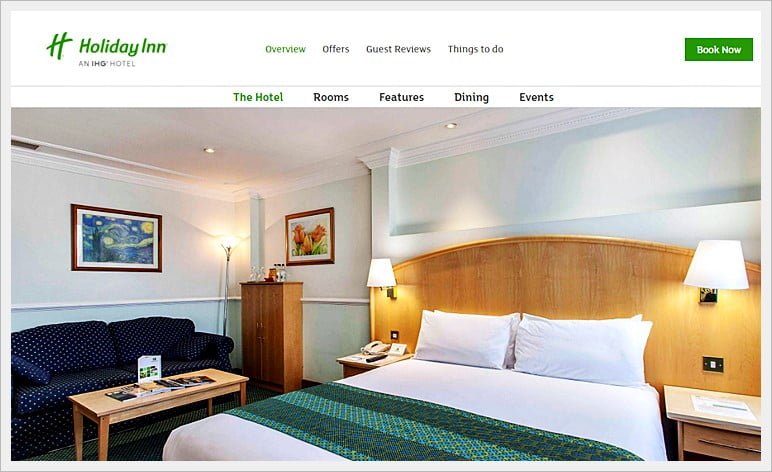
You’ve checked several OTA booking sites like Booking.com and Expedia and compared room prices at a hotel. You may want to check the hotel’s own website to see if there’s a better deal. Hotel chains like Holiday Inn, Premier Inn, and Marriott have their own booking sites and some independent hotels do too.
When booking with an OTA, they take a 15-25 percent cut from the hotels. This means less money for the hotels and they prefer you to book directly. But prices are often not much different. So hotels may throw in sweeteners like free breakfast, free internet access, and late check-out.
Also, it doesn’t hurt to call the hotel. Not the toll-free number, which takes you to a call center, but the hotel directly. Hotel managers have some leeway to give a better deal than what their websites mention. They are more willing to give to regular customers, when business is slow, for longer stays, and for booking several rooms.
Use a Hotel Metasearch Site

In one quick search, a metasearch search engine will scan multiple providers or booking sites. Enter the location, dates, and number of people traveling. The results are then aggregated into a single page so you can compare prices and deals from various providers. It’s much quicker than researching each booking site yourself.
Kayak, HotelsCombined, Tripadvisor, and Trivago are the most popular metasearch sites. Each will have its own selection of providers. They often include popular major OTAs like Expedia, Booking.com, Hotels.com, Agoda, and Trip.com. In addition, a selection of hotel chains, smaller booking sites, and even independent hotels.
You can’t book on a metasearch site and they don’t take your money. Identify the provider offering the deal you like on the metasearch site. Then click the link and you’ll be redirected to the provider’s website, to do the booking. Metasearch sites are free to use and there’s no extra cost when you book with the provider.
Sign Up as a Member

Leading online travel agencies (OTA) offer membership programs to spur you to use their booking sites. Even big hotel chains like Marriot, Premier Inn, and Hilton have their membership programs. As a member, you enjoy exclusive benefits. It’s free to join and there’s no risk. Besides, it only takes a minute to register.
Being a member, you’ll get access to special deals including discounts. OTA sites usually offer 5-10 percent less on selected properties. Hotel chains will offer special rates on many if not all their properties. They may also offer freebies exclusive to their members like breakfast and internet access.
There’s another benefit to being a member. They have a loyalty rewards program. Basically, the more you book, the more reward points you earn. In addition, the higher the value, the more points you get. With the reward points accumulated, you can claim a discount on your next booking.
A loyalty program from a hotel chain is fine if you prefer to stay with the brand. But an OTA loyalty program, you’re not restricted to a particular brand.
Sign Up for a Hotel Credit Card
Apply for a co-branded hotel credit card, often affiliated with Visa, Mastercard, or American Express. OTAs like Expedia, Hotels.com, and Priceline have their own cards. Major hotel chains like Marriot, Hilton, and Hyatt have their own too. They are incredibly useful if you travel frequently and prefer to use a particular booking site.
So what are the benefits of using co-branded cards? First of all, you’ll not only earn reward points from the booking site but also from your card. In many cases, your card will also earn you reward points for other purchases like paying for groceries. And all these reward points add up to discounts for your next hotel booking.
As an incentive, many co-branded cards give welcome or bonus reward points to new members. These cards are not for everyone though. Only if you’re loyal to a specific OTA or hotel brand booking site to get the maximum benefits. For example, if you’re using a Priceline co-branded card, you’d want to stick to booking with Priceline.
Low Price Guarantee
With a low price guarantee, the booking site you used will price match, and pay the difference if you find the same room cheaper on another website. To qualify, everything about the room must be the same as the other booking site. This includes the same hotel, type of room, period of stay, and purchase terms.
Almost all booking sites will price match. Typically, you’ve 24 hours to submit a claim after booking. But Booking.com and Expedia have a generous low price guarantee. Both booking sites allow you a longer period to send your claim, which is at least 24 hours before the check-in date at the hotel.
Many major hotel chains will not only match the price but also give additional discounts for each night you’ve already booked. Here are some examples from the leading brands. You’ll get a much cheaper hotel rate that’s hard to beat.
- Hyatt – Choice of an additional 20 percent off or 5,000 Hyatt Bonus Points
- IHG – 5 times the IHG rewards points, up to 40,000 points
- Accor – Additional 10-25 percent discount
- Marriott – Additional 25 percent discount
- Hilton – Additional 25 percent discount
Book With Free Cancellation

On many properties, you often have to option to book for a refundable (cost more) or non-refundable (cost less) rate. Refundable rates have free cancellation, you’ll get your money back if you cancel your booking. Non-refundable bookings are certainly cheaper but you won’t get your money back if you cancel for whatever reason.
How can you save money with free cancellation? After booking, the price of the room could drop, or you found a better deal at another hotel. With a refundable rate, you can cancel your booking and get your money back. You can then rebook the same room at a lower price, or book another hotel offering a better deal.
With refundable bookings, always check the last date and time when you can cancel. It’s usually a day before the check-in date but not always the case. It could be 2-5 days before the date. If you cancel after the date, you’re certainly not going to get a refund. So remember to check the last date when you can still cancel.
You may also find properties giving the option to “book now, pay later”. It’s like booking with free cancellation but don’t have to pay right away when booking – payment is due at a later date. The benefit is you can cancel your booking before the due date for payment without having to claim a refund.
Book Non-Refundable Rates
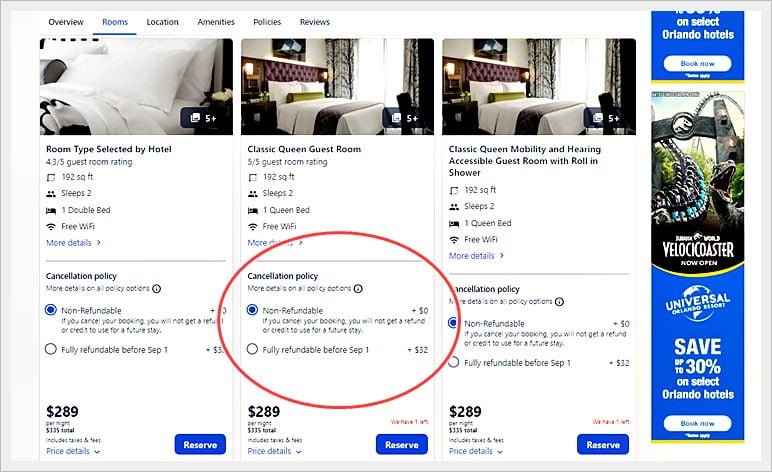
Though you won’t get your money back, non-refundable hotel bookings are quite popular with many travelers. So when is this cheaper option worth considering? Only when you’re certain with your travel plans and don’t anticipate to make any changes or cancellations. So, evaluate the risk before making a decision.
You wouldn’t want to book 6 months or even 2 months in advance for a non-refundable hotel booking. It’s a big risk. You could change or cancel your trip for whatever reason. But worth considering if you were to book closer to the date of the trip like last-minute bookings since you’d be more certain of you travel plans.
On long trips like a 1 month tour of Europe, consider buying travel insurance. A comprehensive plan covers you for medical emergencies. It’ll also reimburse your non-refundable bookings if your travel were unexpectedly changed like a cancelled flight due to bad weather. Then non-refundable bookings would be worth considering.
You may like to read Buying Travel Insurance & What it Covers
Book in Advance
Bookings hotels in advance typically begin 3 months before the check-in date. In popular travel destinations, rates go up as hotels receive more bookings during the period and can double during the peak of the travel season. Besides, the choices of hotels and rooms becomes less available.
You’d want to book at least 3 months in advance and there are several advantages. First of all, hotels have plenty of empty rooms to fill and offer them with discounts. Secondly, there are more hotels and range of rooms available for you to choose. With these in mind, some people book as far as 6 months ahead to get the best picks.
Choose the refundable option for booking in advance. After all, you don’t want to lose your money with the non-refundable option though it’s cheaper. You could change your travel plans. Travel insurance may not cover your non-refundable bookings that far in advance. Some insurance plans could cover you but your premium would go up.
There’s another reason (mentioned earlier) to choose the refundable option for booking in advance. If the hotel offers a better deal after you’ve booked, you can always cancel and rebook again. Or may be you found another hotel offering a better deal. Just remember the final date for cancellation when you made your first booking.
Try Last-Minute Booking
The best time for last-minute hotel bookings is within 7 days before the check-in date. But finding cheap rooms during the period only happens when hotels have many vacant rooms to fill. But if rooms are easily filled like during the peak of the travel season and major holidays, then you can expect inflated prices.
The best time for last-minute deals is when hotels face slow business. To fill their vacant rooms, hotels will drop their prices to get as many bookings as possible. If there are many hotels in the area with lots of vacant rooms to fill, competition heats up and discounts for last-minute deals can go down as much as 30 percent.
So when do hotels face slow business? During the low season for travel, depending on the destination. Also during the shoulder season, though rates are more than the low season but still cheaper compared to the peak season. You get even cheaper rates for last-minute deals from Sunday to Thursday, when occupancy during the week is lower.
Be Flexible With Your Dates
You’ll save money if you’re flexible with your travel dates. Here’s a short survey using Hotels.com. We randomly selected Hilton Garden Inn (New York City), NYMA Hotel (New York City), and Garden Court (London). The search date was August 1, 2021, and the rates shown are from the 15th (Sunday) to the 22nd (Saturday) of August.
| Day | Hilton (U$) | NYMA (U$) | Gdn Court (GBP) |
|---|---|---|---|
| Sun | 144 | 87 | 71 |
| Mon | 144 | 95 | 62 |
| Tue | 144 | 95 | 63 |
| Wed | 143 | 95 | 66 |
| Thr | 152 | 103 | 71 |
| Fri | 220 | 159 | 76 |
| Sat | 220 | 127 | 89 |
From the table, rates vary throughout the week. Sunday is the cheapest when many guests check out and hotels offer discounts to fill their empty rooms. Friday and Saturday are the busiest with weekend vacationers. So hotels raise their rates and are the most expensive days. Rates are between Monday to Thursday.
The trend in the table is typical with most hotels all over the world. If you’re flexible with your travel dates, you can make use of which days of the week offer the cheaper rates. Try avoiding inflated prices on Fridays and Saturdays. Sunday to Wednesday offer the best value for your money.
Book a Bundled Package
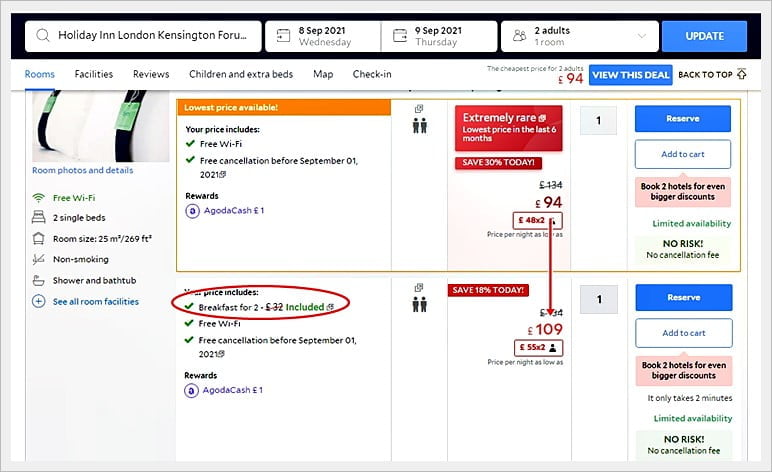
There’s money to save if you book a room bundled with another item. Offering a room with breakfast is the most common bundle. You’ll often see a cheaper room without breakfast and the same room with breakfast at a higher price. The higher price room is worth the deal if you were to pay more for breakfast as separate items, especially if it’s for two.
You may find other bundles like buffet lunches, theatre shows (especially hotels in Las Vegas), free use of the gym, and golf packages. These bundled discounts are usually on the hotels’ own websites to spur you to book directly. A great deal when there are big savings. Besides, it helps you plan your travel budget with fewer unexpected expenses.
Stay Outside the City Center
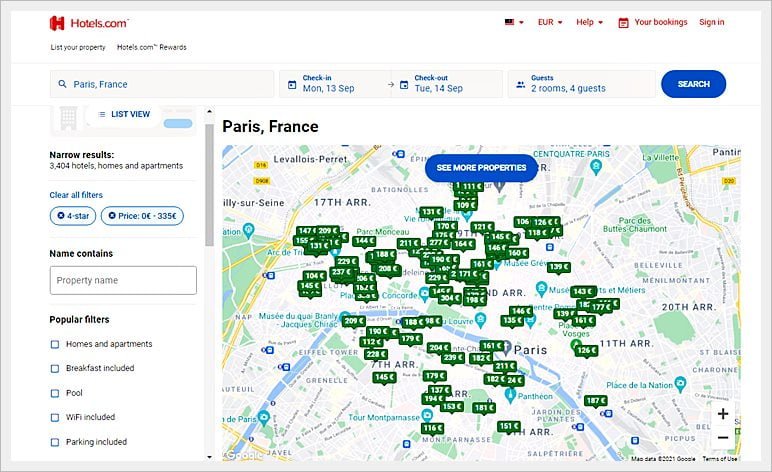
There are many reasons to stay in and outside the city center. Staying downtown, there’s often the benefit of shopping, dining, entertainment, and good transport. It’s usually quieter outside the city center and doesn’t have to be drab. Besides, you’d be staying in a unique part of the city that you wouldn’t get to know staying downtown.
To stay in or outside the downtown area is a personal choice. One thing for certain, prices of hotel rooms outside the city center can drop as much as 50 percent. A good booking site will have location maps showing hotels in the area. Use it as a tool to identify cheaper rooms outside the city center.
You don’t have to stay far from downtown to get cheaper rooms. Stay just outside, where transport links are just as good in most big cities. Use the map filters to find hotels by neighborhood, star rating, and price range. Now you have a good idea of the hotels at the price you want.
Travel Outside the Peak Season
Almost every destination has its peak, shoulder, and low seasons for travel. Knowing when to travel is one of the best ways to get the best prices for hotel rooms. Here’s a general description of the travel seasons.
- Peak season – Summers are the peak seasons for traveling. It’s the busiest time of the year for tourists. Not to mention a drag on your wallet with overpriced flight tickets and hotel rooms. That said, winters are the peak season at the ski resorts.
- Shoulder season – Spring and autumn are the shoulder seasons. The weather is generally mild and almost like summer at the end of spring or early autumn. You’ll still find tourists but it’s never a crowd and room rates are cheaper.
- Low season – Winters are the low seasons, except the ski resorts. It’s too cold to travel for most, so even fewer tourists than during the shoulder season. With plenty of rooms to fill, hotels are more than willing to offer huge discounts.
Travel during the shoulder season and you’ll find rooms for 20-30 percent less. You’ll pay even less during the low season. The following is an overview of shoulder and low seasons in some regions around the world. You may want to read this article from Culture Trip about different travel seasons around the world.
North America
The peak of the travel season in North America is generally from June to August. But North America is such a vast continent that you can find milder weather in the south for traveling outside the peak season. Consider heading to Florida in winter, New England in autumn, or the Grand Canyon in Spring.
- Shoulder season – The shoulder season in the United States and Canada is in April-May and September-October. But the one-week spring break in April or May is exceptionally busy. It’s a brief period though, and returns to its usual shoulder pace.
- Low season – November-March is a cold period but it’s mild weather on the Gulf Coasts. Thanksgiving, Christmas, and the New Year holidays are busy times though. So you can expect pricey flight tickets and room rates around the holidays. But it’s back to the low season after the holidays.
- Hawaii – It’s the opposite in the tropical islands of Hawaii. The peak season is a long stretch in November-March and the low season is in April-June. The shoulder season in July-September still attracts tourists but with a smaller crowd compared to the peak season.
Europe
Like North America, the peak season is June through August. But Europe, as a region, welcomes visitors throughout the year. Cities like London, Paris, and Amsterdam receive a steady flow of visitors throughout the year. And mild winters in the Mediterranean make the region a year-round destination.
- Shoulder Season – The shoulder season is generally in March-May and September-November. The weather is decent for traveling in Northern Europe during this time of the year. It’s still summer for a vacation in Mediterranean Europe in September-October.
- Low season – The low season is in December-February. Most find it too cold to travel in Northern Europe unless they plan to go to ski resorts. Compared to Northern Europe, it’s mild temperatures and a fair amount of sunshine in Mediterranean Europe.
Caribbean Islands
The peak season is generally December through March. Sunny weather throughout the year makes the islands of the Caribbean year round destinations. The region offers some of the best tropical island vacations. Popular islands include Jamaica, Aruba, Bahamas, Cayman Islands, and the US Virgin Islands.
- Shoulder season – The shoulder season in the Caribbean is in April-May and October-November. There’s a large number of vacationers but never as large as the peak season. The weather is warm and sunny though you can expect some mild showers in the late afternoons.
- Low season – The low season is in June-September. This is the hurricane season but your odds of experiencing one are slim. But you can expect tropical rain showers usually occurring in the afternoons or evenings. And the rest of the day is back to sunny skies.
Southeast Asia
Southeast Asia is another tropical destination as well as a year round destination. The peak season is generally in November-February but can vary 1-2 months depending on the country. Popular destinations in Southeast Asia include Thailand, Vietnam, Laos, Cambodia, Malaysia, and Singapore.
- Shoulder season – For most of Southeast Asia, there’s only one shoulder season and that’s generally March through May. Temperatures tend to rise by a few degrees during the day but are much cooler by late afternoon. There’s always the cooler highlands to explore.
- Low season – June-October is the rainy (monsoon) season when it rains almost daily. But showers are usually about an hour long, often in the early mornings or late afternoons. The timing of the rain is almost predictable and you could easily plan out your days.
Try Hotel Mystery Deals
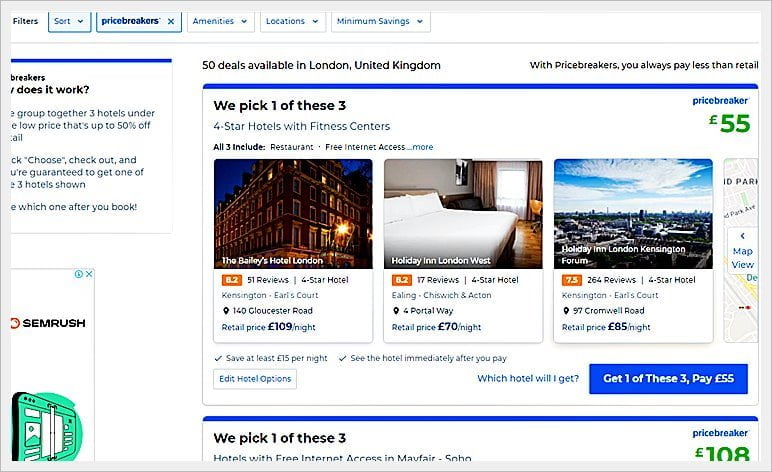
Mystery deals offer deep discounts that are 30-60 percent less than the published rates. Priceline and Hotwire are the most popular websites for mystery deals. Rooms are from top-end hotels that have plenty of empty rooms to fill. There’s a catch. You’ll only know the name of the hotel after you’ve book and it’s non-refundable.
This is how mystery deals work. You’re given the names of three hotels within an area, their ratings, the price to pay, but you don’t know which one you’ll get. You can easily find out about the hotels from their names. If you’re fine getting any of the three, go ahead and book. Remember, mystery deals are only if you’re flexible with any hotel given.
Third-Party Discount Coupons

Hotel booking sites including hotel chains don’t regularly send out discount coupon codes in their email newsletters. Still, not many think of getting these discounts from third party coupon sites. They are there if you search the web and not hard to find. These coupons offer an extra 5-10 percent off when you book online.
Websites that offer hotel coupons include Coupon Sherpa, Coupon Follow, RetailMeNot, and DealsPlus. Even media sites like Wall Street Journal and CNET have a coupon section. Key in “wsj hotel coupons” and “cnet hotel coupons” and you’ll find them. Try more searches like “hotel promo codes”, “expedia coupons”, and “hyatt hotel coupons”.
Use the discount code in the payment section before clicking the pay button. Coupons have an expiry date and are usually good for 1-4 weeks. So search the latest coupons on the web before you book. Or sign up for the coupon sites’ email newsletters to receive the latest codes and get that extra discount.
Alternative Accommodations
There are alternatives besides the usual hotels. If you’re willing to consider, there are options that are friendly to your travel budget. Off course, they offer a different kind of experience than a hotel. But for travelers who prefer the alternative experience, they are fun besides saving money.
Book a Vacation Rental (Entire Home)

A vacation rental is where the host rents out the entire house or apartment for your private use. It’s a great for families and group travel. But is a vacation home cheaper than booking multiple rooms at a hotel? It all depends. Rentals range from budget-friendly apartments to luxury villas. So if you know what to look for, you’ll save.
A big room for a family of four (2 adults and 2 kids) at a 3-star hotel in Miami Beach cost US$130-200 per night. Stay in a nice apartment and it’s US$90-140 per night. Besides the savings, you get a much larger space for the kids. There’s also the kitchen to make your own meals and help cut down your expenses.
The following are popular travel sites for vacation rentals. They offer a broad range of vacation homes. And you’re sure to find a good range that is cheaper than staying at a hotel. Click the links to check them out.
- Airbnb – A huge inventory of over 6 million around the world. Around half are vacation homes but still a big list anywhere in the world.
- Vrbo – More than 2 million vacation properties around the world. Popular with families with many rentals promoted as family and kid-friendly.
- Tripadvisor – More than 800,000 vacation homes in over 190 countries. The most popular travel review site by the world’s largest travel community.
- Booking.com – The leading hotel booking site with a growing list of vacation homes around the world. But works best for finding rentals in Europe.
- Agoda – Best performer for finding rentals in Asia compared to Booking.com and Hotels.com. Has a strong network with local providers.
- Hotels.com – There are vacation homes across the globe. But a large share of the rentals are in North America and Europe.
You may like to read The Best Vacation Rental Sites
Stay in a Hostel
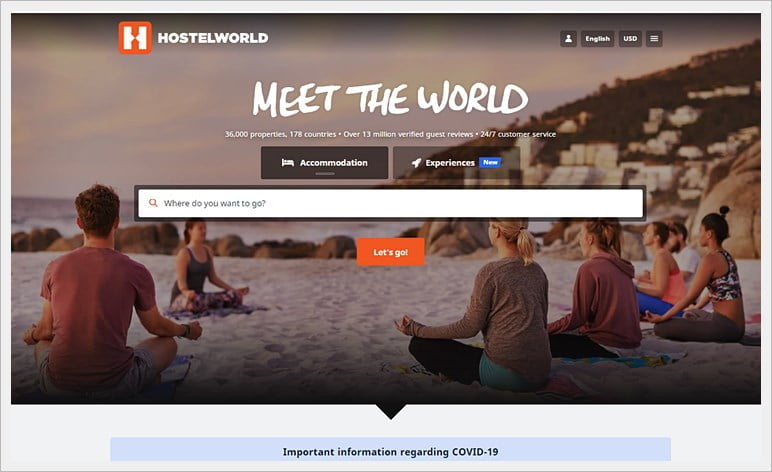
Hostels are popular in Europe and Asia but less so in North America. It’s popular with young travelers on small budgets like backpackers. Typically, you share a room or dorm with others sleeping on bunkbeds – could be 4-20 beds in a room. Since prices are by the bed, your cost is 50-70 percent less than a room at a budget-priced hotel.
On the whole, hostels are safe places but always be alert. Most provide security lockers to keep your personal items. If it’s privacy you want, many offer private rooms but expect the basics. Hostel don’t provide toiletries and bring your own towels. Some might provide the item for a small fee.
Staying at a hostel is about communal living. You can bank on sharing the bathroom with others. Lounge areas for socializing are common at hostels. Some have a communal kitchen if you want to cook and most will have a simple café. Many provide free WiFi but don’t expect whopping speed. Washing machines are usually available for a fee.
Here’s an overview of travel sites that offer hostels for budget-minded travelers. Though hostels target young travelers, many welcome senior travelers on a budget who often prefer a private room. Some even offer family rooms for up to four.
- Hostelworld – This is the largest travel site for hostels. The website has more than 17,000 properties in nearly 180 countries.
- Hosteling International – A non-profit organization representing youth hostels around the world. It lists over 4,000 affiliated hostels in 80 countries.
- Hostelclub – A small inventory outside Italy. But a very large list of over 4,000 hostels and other cheap lodgings in Italy.
- Booking.com – A hotel booking site that also offers hostels. Not always the cheapest but a fairly large list of hostels around the world.
- Agoda – Another hotel booking site. Works best for finding hostels in Asia, even destinations that are off the beaten track.
Book a Room at a Homestay

A homestay is where the host rents out a spare room and not the entire place. A homestay is obviously cheaper than a hotel room. For example, a night at a 3-star hotel in New York City cost US$100-150. But a room at a homestay in the city cost US$50-100. Similarly a 3-star hotel in London cost £60-110 but £40-70 at a homestay.
Both hostels and homestays offer cheap lodgings. At a hostel you’re staying with other travelers. At a homestay, you’re living like a local with the host. There’s often the personal touch that you won’t get from a hostel or hotel. You usually have access to the living room, kitchen, and washing machine though some may charge a small fee.
Rooms at homestays are usually single or double occupancy, ideal for solo travelers and couples. Not many travel sites offer homestays. Some hotel booking sites claim to offer homestays but are in actual fact hostels, boutique hotels, and other kinds of lodgings. The following offer real homestays.
- Airbnb – The largest travel site for homestays, besides vacation rentals, connecting travelers with homeowners around the world. There’s usually a selection of shared and private rooms.
- Homestay.com – More than 37,000 homestays in over 180 countries. Fewer properties than Airbnb but often cheaper rooms. Besides, Homestay.com recommends hosts provide free light breakfast to their guests.
